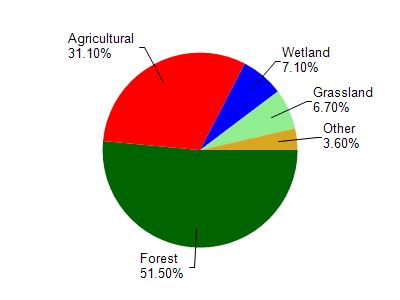Adams
No
No
No
Fish and Aquatic Life
Overview
Unnamed Ditch 13-13 is an eight-mile tributary to Leola Ditch. The lower portion of the stream supports a warm water game fishery while the upper reaches support a forage fishery. There are several cranberry marshes that can discharge water to the lower reaches of the ditch. These discharges can impact habitat and water quality by delivering sediment and nutrients to the ditch. Stream flow fluctuations are also evident and may be a result of water usage by the marshes. Limiting factors of stream habitat include; channel ditching, sedimentation from surrounding crop fields, nutrification, fluctuating streamflow and the lack of pool, riffles and fish cover. HBI results suggest there is significant organic loading to the ditch.
Date 2002
Author Aquatic Biologist
Historical Description
Unnamed Ditch (Rome Township, T20N, R6E, Section 13 -13).
Surface Acres = 9.8, Miles = 7.6.
Light brown, hard water. Primarily sand bottom.
Direction of flow : Westerly. Tributary of: Leola Ditch.
Fishery : Forage species. Remarks : Drainage ditch.
Access : Several road crossings, 0.62 mile public frontage.
From: Klick, Thomas A. and C.W. Threinen. 1966. Surface Water Resources of Adams County:
Lake and Stream Classification Project. Wisconsin Conservation Department, Madison, WI.
Date 1966
Author Surface Water Inventory Of Wisconsin
General Condition
This Unnamed Stream (WBIC 1378400) was assessed during the 2018 listing cycle; new total phosphorus and biological (macroinvertebrate Index of Biotic Integrity (IBI) scores) sample data were clearly below the 2018 WisCALM listing thresholds for the Fish and Aquatic Life use. This water was meeting this designated use and was not considered impaired.
Date 2017
Author Ashley Beranek
Condition
Wisconsin has over 84,000 miles of streams, 15,000 lakes and milllions of acres of wetlands. Assessing the condition of this vast amount of water is challenging. The state's water monitoring program uses a media-based, cross-program approach to analyze water condition. An updated monitoring strategy (2015-2020) is now available. Compliance with Clean Water Act fishable, swimmable standards are located in the Executive Summary of Water Condition in 2018. See also the 'monitoring and projects' tab.
Reports
Management Goals
Wisconsin's Water Quality Standards provide qualitative and quantitative goals for waters that are protective of Fishable, Swimmable conditions [Learn more]. Waters that do not meet water quality standards are considered impaired and restoration actions are planned and carried out until the water is once again fishable and swimmable
Management goals can include creation or implementation of a Total Maximum Daily Load analysis, a Nine Key Element Plan, or other restoration work, education and outreach and more. If specific recommendations exist for this water, they will be displayed below online.
Monitoring
Monitoring the condition of a river, stream, or lake includes gathering physical, chemical, biological, and habitat data. Comprehensive studies often gather all these parameters in great detail, while lighter assessment events will involve sampling physical, chemical and biological data such as macroinvertebrates. Aquatic macroinvertebrates and fish communities integrate watershed or catchment condition, providing great insight into overall ecosystem health. Chemical and habitat parameters tell researchers more about human induced problems including contaminated runoff, point source dischargers, or habitat issues that foster or limit the potential of aquatic communities to thrive in a given area. Wisconsin's Water Monitoring Strategy was recenty updated.
Grants and Management Projects
| Project Name (Click for Details) | Year Started |
|---|
|
|
Monitoring Projects
| WBIC | Official Waterbody Name | Station ID | Station Name | Earliest Fieldwork Date | Latest Fieldwork Date | View Station | View Data |
|---|
| 1378400 | Unnamed | 10009157 | Unnamed Ditch 13-13 Downstream Cth W Site 2 | 11/17/1999 | 11/17/1999 | Map | Data |
|

Watershed Characteristics
Unnamed is located in the Big Roche A Cri Creek watershed which is 177.00 mi². Land use in the watershed is primarily forest (51.50%), agricultural (31.10%) and a mix of wetland (7.10%) and other uses (10.30%). This watershed has stream miles, lake acres and 11,429.84 wetland acres.
Nonpoint Source Characteristics
This watershed is ranked High for runoff impacts on streams, Low for runoff impacts on lakes and High for runoff impacts on groundwater and therefore has an overall rank of High. This value can be used in ranking the watershed or individual waterbodies for grant funding under state and county programs.However, all waters are affected by diffuse pollutant sources regardless of initial water quality. Applications for specific runoff projects under state or county grant programs may be pursued. For more information, go to surface water program grants.